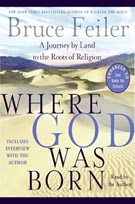At a time when America debates its values and the world braces for religious war, Bruce Feiler, author of the New York Times bestsellers Walking the Bible and Abraham, travels ten thousand miles through the Middle East to examine the question
Is Religion Tearing Us Apart ... Or Can it Bring Us Together?
Where God Was Born combines the adventure of a wartime chronicle and an archaeological detective story with an inspiring journey of spiritual exploration. Taking readers to biblical sites not seen by Westerners for decades, it uncovers little-known details about the common roots of Judaism, Christianity, and Islam and affirms the importance of the Bible in today's world.
Where God Was Born observes that at the birth moment of the biblical religions, all of the faiths took from one another, exchanged ideas, recognized their commonalities, and were open to peaceful coexistence. Offering a rare vision of God that can unite different faiths into a shared allegiance of hope, this is a brave, challenging, and profound work that addresses the most important issues of our time.
Enhanced CD: Put this CD in your computer to view photographs from Walking the Bible: A Photographic Journey




